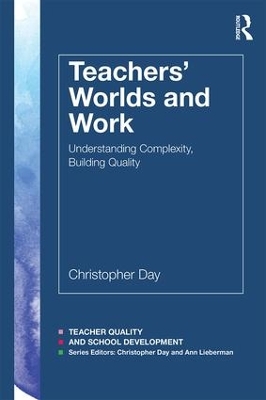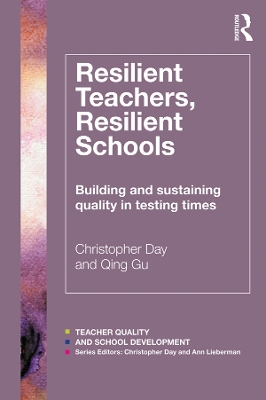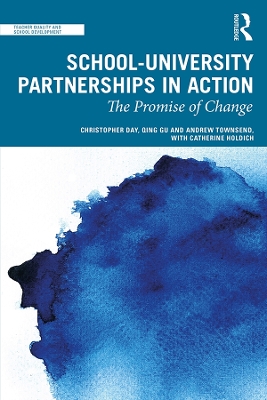Teacher Quality and School Development
6 total works
Understanding what influences the quality of teachers’ work across a career is key to building and sustaining their on-going commitment and effectiveness. Teachers’ Worlds and Work provides a new, research-informed consideration of key elements which independently and together influence teachers' work and lives: policy and workplace conditions, teacher professionalism, identity, emotions, commitment and resilience, types of professional learning and development, and the importance of the contribution to these made by high-quality leadership. In bringing these elements together, the book provides new, detailed and holistic understandings of their influence and suggests ways of building and sustaining teachers' abilities and willingness to teach to their best and well over their careers. This groundbreaking text will be essential reading for teacher educators, teachers, head teachers and academics.
This book unpicks the complex, dynamic blend of individuals’ psychological and professional assets, workplace conditions and leadership support which enable teachers who stay in teaching to continue to make a difference in their careers, regardless of shifts in policy, workplace, professional and personal circumstances.
Whilst much has been written over the years about teacher stress and burnout, there is very little research which reports on the conditions which are essential for teachers to sustain their commitment and effectiveness over their professional lives, in contexts of challenge and change. Drawing upon a range of educational, psychological, socio-cultural and neuro-scientific research, together with vivid accounts from teachers in a variety of primary and secondary schools internationally, and from their own research on teachers’ work and identities, the authors discuss the dynamic nature, forms and practices of teacher resilience. They argue that resilience in teachers is not only their ability to bounce back in extremely adverse circumstances but that it is the capacity of teachers for everyday resilience which enables them to sustain their commitment and effectiveness in responding positively to the unavoidable uncertainties inherent of their professional lives.
The authors conclude that resilience in teachers can be nurtured by the intellectual, social and organisational environments in which teachers work and live, rather than being simply a personal attribute or trait, determined by nature. Resilient Teachers, Resilient Schools will be of key interest to policy makers, head teachers, teachers and training and development organisations who wish to improve quality and standards in schools.
The New Lives of Teachers examines the varied, often demanding commitments on teachers' lives today as they attempt to pursue careers in primary and secondary education. Building upon Huberman's classic study, it probes not only teachers' everyday lives, but also the ways in which they negotiate the pitfalls of professional development and the different life and work 'scenarios' that challenge their sense of identity, well-being and effectiveness.
The authors provide a new evidence-based framework to investigate and understand teachers' lives. Using a range of contemporary examples of teaching, they demonstrate that it is the relative success with which teachers manage various personal, work and external policy challenges that is a key factor in the satisfaction, commitment, well-being and effectiveness of teachers in different contexts and at different times in their work and lives. The positive and negative influences upon career and professional development and the influences of school leadership, culture, colleagues and conditions are also shown to be profound and relate directly to teacher retention and the work-life balance agenda. The implications of these insights for teaching quality and teacher retention are discussed.
This book will be of special interest to teachers, teachers' associations, policy makers, school leaders, and teacher educators, and should also be of interest to students on postgraduate courses.
School-University Partnerships in Action
by Christopher Day, Qing Gu, Andrew Townsend, and Kate Holdich
This book provides new knowledge, insights and experience about school-university partnerships. Drawing upon evidence from international research of the world's most improved systems, and learning from a UK research council funded 'knowledge exchange' project, it reveals that when the profound differences between the practice worlds of schools and the theoretical worlds of university academics are embraced and cherished, rather than eschewed, school-university partnerships become exciting avenues of learning which connect, challenge and transform the thinking and practice of all those involved.
Over its eight chapters, the book explores uncertainties, challenges and possibilities faced by those who seek to create, develop and sustain school-university partnerships that aspire to improve the practice and understanding of the leadership of teaching and learning in schools. It explicates and elucidates precepts, principles and practices for achieving such successful partnerships between higher education and school leaders, and contextualises these in terms of policy wide developments internationally.
This book will appeal to school leaders internationally, leadership training organisations, and academics who lead postgraduate leadership and management programmes.
Leadership and Policy in Schools
by Qing Gu, Christopher Day, Allan Walker, Paul Armstrong, Darren Bryant, Junjun Chen, James Ko, and Pam Sammons
School-University Partnerships in Action
by Christopher Day, Qing Gu, Andrew Townsend, and Catherine Holdich
This book provides new knowledge, insights and experience about school-university partnerships. Drawing upon evidence from international research of the world's most improved systems, and learning from a UK research council funded 'knowledge exchange' project, it reveals that when the profound differences between the practice worlds of schools and the theoretical worlds of university academics are embraced and cherished, rather than eschewed, school-university partnerships become exciting avenues of learning which connect, challenge and transform the thinking and practice of all those involved.
Over its eight chapters, the book explores uncertainties, challenges and possibilities faced by those who seek to create, develop and sustain school-university partnerships that aspire to improve the practice and understanding of the leadership of teaching and learning in schools. It explicates and elucidates precepts, principles and practices for achieving such successful partnerships between higher education and school leaders, and contextualises these in terms of policy wide developments internationally.
This book will appeal to school leaders internationally, leadership training organisations, and academics who lead postgraduate leadership and management programmes.



